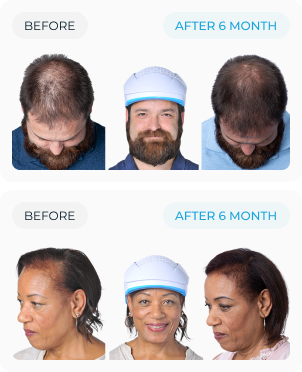Scalp psoriasis is a chronic condition that can turn your scalp into a battleground—and your hair often pays the price. If you’ve ever noticed more hair in your comb during a flare-up, you’re not imagining things. The link between scalp psoriasis and hair loss is very real, and it’s all thanks to the inflammatory chaos this autoimmune condition unleashes on your skin and follicles.
The good news is that scalp psoriasis doesn’t directly destroy hair follicles, so hair loss from it is usually temporary. The bad news? Chronic inflammation, relentless itching, and the stubborn build-up of scales can sabotage your scalp health and leave your hair struggling to grow back.
But how exactly does this happen? And more importantly, what can you do to prevent it?
We’re breaking it all down for you—because understanding this connection is the first step to protecting your hair and keeping your scalp in check.
What is Scalp Psoriasis?
Scalp psoriasis is an autoimmune disorder where your immune system decides to crank up the speed of skin cell production—faster than your scalp can handle. The result is thick, scaly patches that set up camp on your scalp, bringing redness, irritation, and relentless itching along for the ride. Globally, this condition impacts 2-3% of the population, with nearly half of those dealing with psoriasis finding it creeping onto their scalps.
But scalp psoriasis isn’t just about discomfort; it’s about disruption. Emerging research suggests that an imbalanced scalp microbiome can contribute to inflammatory conditions like scalp psoriasis. Disruptions in the natural bacterial and fungal balance can trigger immune responses, exacerbating psoriasis symptoms and weakening the scalp barrier. The stubborn plaques interfere with scalp health, clogging hair follicles and fueling inflammation that can lead to a disturbed hair growth cycle.
Left unchecked, this can temporarily halt your hair’s growth. While most cases of psoriasis hair loss regrowth are possible, severe or untreated cases risk permanent damage.
What Are the Signs and Symptoms of Scalp Psoriasis?
Recognizing the signs and symptoms early can save you from an irritated scalp, unnecessary psoriasis and hair thinning.
Here’s a breakdown of what you might encounter:
-
Red, scaly patches on the scalp: These are the hallmark signs of psoriasis caused by an overproduction of skin cells.
-
Persistent itching and burning: Psoriasis causes itching and burning sensations on your skin and makes your scalp feel like it’s begging for relief.
-
Flaking that resembles dandruff: If the flakes on your shoulders seem more aggressive than usual, it could be psoriasis and not a bad hair care routine.
-
Dry scalp with cracks or bleeding: Severe cases of dry and itchy scalp may lead to painful cracks that can bleed, making the condition more than just a cosmetic concern.
-
Hair thinning or shedding near affected areas: While psoriasis doesn’t directly cause hair loss, the inflammation and damage from scratching can lead to noticeable thinning.
Catching these symptoms early can help you manage them before they spiral into more severe issues. The sooner you address these signs, the better your chances of protecting your hair and scalp health.
Can Scalp Psoriasis Cause Hair Loss?
Yes, scalp psoriasis can lead to hair loss and baldness, but the condition itself isn’t the direct culprit. Psoriasis doesn’t destroy your hair follicles outright. Instead, the real troublemakers are the inflammation, relentless itching, and the stubborn build-up of plaques that come with it. These factors create a perfect storm for disrupting the natural hair growth cycle.
When psoriasis flares up, inflammation at the scalp can weaken hair follicles, forcing hair to shed prematurely. Persistent itching and excessive scratching can also cause physical damage to the scalp and hair shaft. On top of that, the thick scales that psoriasis produces can suffocate follicles, making it harder for new hair to grow.
However, hair loss from scalp psoriasis is usually temporary, and hair regrowth often resumes once you address the inflammation and start a consistent scalp psoriasis treatment. The key is early identification and management of the root causes of scalp psoriasis to minimize damage and keep your scalp as healthy as possible.
How Can Scalp Psoriasis Lead to Hair Loss?
The relationship between scalp psoriasis and hair loss is complicated but not inevitable. While psoriasis itself doesn’t attack your hair follicles, the condition creates a hostile environment that disrupts the scalp’s delicate balance.
So, how does this autoimmune condition cause hair to shed?
1. Scalp Inflammation
Inflammation is the hallmark of psoriasis—and it’s a menace to your hair follicles. When inflammation takes hold, it disrupts the follicle’s normal function and pushes hair into the shedding phase prematurely. Over time, this constant cycle of scalp inflammation can exhaust your follicles, making regrowth slower and less consistent.
2. Itching and Scratching
Psoriasis flare-ups bring relentless itching and scratching, which may feel like the only relief. But, over-scratching weakens your hair shafts and damages the surrounding follicles. Even worse, chronic scratching can lead to scabs and infections, both of which contribute to excessive hair loss and prolonged recovery.
3. Build-Up of Scales
The thick, silvery plaques of psoriasis don’t just irritate the skin; they block hair follicles entirely. When follicles are suffocated by these scales, it becomes nearly impossible for new hair to grow. Prolonged plaque build-up also weakens the hair shaft, increasing breakage and thinning.
Is Scalp Psoriasis Hair Loss Permanent?
In most cases, hair loss caused by scalp psoriasis is not permanent. Once the inflammation is under control and the scalp heals, hair follicles can resume their normal growth cycle. However, chronic inflammation or prolonged untreated cases can lead to scarring on the scalp, causing alopecia and making the hair loss irreversible.
The key to avoiding permanent damage lies in timely intervention. Effective psoriasis scalp remedies, like medicated shampoos, topical treatments, and anti-inflammatory therapies, can minimize flare-ups and protect your follicles. Neglecting scalp psoriasis not only worsens the symptoms but also increases the risk of scarring that blocks hair follicles from regrowing.
Acting early with targeted remedies not only saves your hairline but also your peace of mind. So, while scalp psoriasis might be annoying, letting it linger unchecked could be a long-term regret. Stay proactive and consult a dermatologist when flare-ups don’t subside.
How to Reduce Hair Loss Due to Scalp Psoriasis?
Scalp psoriasis can cause severe hair loss problems if not managed properly. However, you can reduce the extremity of scalp psoriasis hair loss. Here are a few points that help minimize hair loss from psoriasis on the scalp.
- Use Medicated Shampoos Alternately: Try alternating medicated shampoo and non-medicated, gentle shampoo to avoid over drying your scalp and hair.
- Avoid Scratching or Picking Scales: Scratching weakens hair at the root. Instead, soften plaques with oils (like coconut or olive oil) and gently remove them using a fine-tooth comb after treatment.
- Practice Gentle Hair Care: Use a wide-tooth comb, pat hair dry instead of rubbing, and avoid tight hairstyles or heating tools. This minimizes traction alopecia and breakage in sensitive areas.
- Manage Stress Levels: Psoriasis flares and stress-induced hair shedding (telogen effluvium) often go hand in hand. Practice relaxation techniques like meditation, exercise, or breathing routines to keep cortisol levels in check.
- Keep the Scalp Moisturized: Use psoriasis-friendly moisturizers or scalp oils to maintain hydration and reduce scale buildup, preventing irritation and friction that can lead to hair loss.
- Avoid Harsh Hair Products: Stay away from products with alcohol, sulfates, or artificial fragrances that may irritate the scalp and worsen flare-ups.
- Support Scalp Microbiome Health: Research shows scalp psoriasis may disrupt the scalp microbiome. Consider mild, pH-balanced shampoos and possibly probiotic support to maintain healthy skin flora.
- Eat a Nutrient-Rich Diet: Anti-inflammatory foods rich in omega-3s, zinc, biotin, and vitamin D can support both immune regulation and hair health.
- Consult a Dermatologist for Targeted Treatment: A certified dermatologist can provide personalized therapies, including light therapy (phototherapy) or biologics, for stubborn scalp psoriasis that’s contributing to ongoing hair loss.
How to Treat Hair Loss Due to Scalp Psoriasis?
Different home remedies and professional treatments are available to manage psoriasis on the scalp, which minimize the damage to your hair while tackling the underlying inflammation and scaling. Here’s a breakdown of what works best to keep your scalp healthier and reduce hair loss due to scalp psoriasis.
1. Treating Scalp Psoriasis to Minimize Hair Loss
The key to managing psoriasis-related hair loss is addressing the condition itself. Inflammation, scaling, and irritation need to be controlled to create a scalp environment where hair can thrive.
Topical Medications
Topical medications like Corticosteroids and Selenium sulfide reduce inflammation fast, making them a go-to for many dermatologists. For long-term care, vitamin D analogs help normalize skin cell turnover, while salicylic acid breaks down tough scales that clog follicles.
You can use scale softeners that help loosen and remove thick scales, making it easier for other treatments to penetrate the skin. These products can be found in medicated shampoos or as separate scalp treatments and often contain ingredients like salicylic acid or tar.
Medicated Shampoos
Tar-based shampoos may sound old-school—and, let’s be honest, they don’t win any awards for scent, smelling quite literally like the tar used to pave roads. They can also be sticky and a bit messy. However, they remain highly effective for soothing irritation and slowing down excessive cell production. For an added antimicrobial boost (without the same odor challenge), shampoos with ketoconazole or zinc pyrithione can help calm redness and flaking.
Phototherapy
Light-based treatments, such as narrow-band UVB therapy, target psoriasis patches without affecting hair follicles. This treatment can reduce inflammation and scaling while allowing follicles to function optimally.
2. Recovering Hair Loss After Scalp Psoriasis
While treating scalp psoriasis minimizes the root cause of hair loss, focusing on hair regrowth is equally essential.
Stimulating Regrowth
Minoxidil, widely used for various types of hair loss, can help stimulate dormant follicles to regrow hair. Always consult a dermatologist before use to ensure it’s suitable for your condition. Additionally, boosting your well-balanced diet with supplements rich in the scalp-healthy ingredients can support hair health from the inside out.
Laser Phototherapy(LPT)
If you’re looking for a non-invasive yet effective option, laser phototherapy devices improve blood flow and awaken sluggish hair follicles. This treatment is scientifically backed to promote regrowth without aggravating sensitive scalps.
A great example of an LPT device is the Theradome hair growth helmet designed to combat hair loss associated with scalp psoriasis. Using laser phototherapy, Theradome helmet emits specialized lasers at a wavelength of 680 nm that penetrate the scalp, stimulating hair follicles, reducing inflammation, and promoting cellular regeneration. By improving blood circulation and encouraging dormant hair follicles to enter the active growth phase, Theradome offers a non-invasive, convenient treatment option for individuals experiencing hair thinning or loss due to psoriasis.
Conclusion
Scalp psoriasis doesn’t have to mean permanent hair loss or baldness. By understanding the connection between the two and adopting proactive treatments, you can protect your scalp, manage symptoms, and support healthy regrowth. Early intervention and the right care are key to keeping your hair and confidence intact.
Also, check out about hair loss due to scalp eczema and learn how to treat it.

























